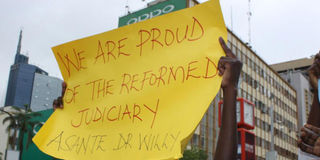Why development without adherence to law is meaningless

Judiciary staff march in Nairobi in praise of Chief Justice Willy Mutunga' work during the launch of the Court-Annexed Mediation Programme at Milimani on May 3, 2016. Adherence to the law as declared by the courts is the principal obligation of any person seeking public office. PHOTO | ANTHONY OMUYA | NATION MEDIA GROUP
What you need to know:
- Time has come for voters to make a mindshift and move beyond promises of roads, laptops and electricity.
- Disobedience of court orders by ministers and other officials continues to add to this erosion of faith in courts as arbiters of the law.
- Those seeking leadership should be challenged to recite the words of the oath of office.
Kenyans are used to campaigns littered with violence, name-calling and boasts of might.
When they get to issues, the usual refrain is development politics.
Incumbents strut claims of roads, railways and dams built or yet to be built.
Challengers question the development record of incumbents.
Time has come for voters to make a mindshift and move beyond promises of roads, laptops and electricity.
Our elections are a competition about promises, about who among candidates would be the best social worker.
This crude view of leadership is given the air of an economic vision for the country and its citizens curved up in plans and pillars within manifestos of parties or coalitions.
What almost no politician has ever appreciated is that freedom is the end and foundation of a sound economic life.
Elections should be about freedom and the rule of the law.
While we brag about a progressive Constitution, the state of affairs is at odds with a country on a trajectory of socio-economic progress.
Leaders around the world believe Kenya is a nascent if not established narco state.
This is arguable but in the last few weeks, we have witnessed an example of a roguish country.
DISREGARD OF LAW
Two citizens have been extra-judicially rendered to another country to stand trial.
The irony is that at the time of the rendition, court proceedings for their extradition were on.
The subtle message is that court proceedings were an impediment to dealing with known drug-dealers.
A few years ago, the President witnessed the destruction of a ship impounded for reportedly transporting narcotics into Kenya.
The destruction was carried out despite a court order.
In short, the lesson would appear to be that the drug menace can only be addressed by extra-judicial means or obedience of court orders must not stand in the way of dealing with issues like drugs.
Disobedience of court orders by ministers and other officials continues to add to this erosion of faith in courts as arbiters of the law.
There are cabinet secretaries serving the public but in disobedience of court orders.
The problem does not just end with powerful people in the Executive and other arms of government.
Citizens have taken cue. The number of people drawing guns in public without justification are manifold.
In all the examples of impunity cited, one thing is obvious; the law means nothing to those who have the political or financial ability to sidestep, evade or ignore the consequences of illegal actions.
Impunity and disregard for the law is institutionalised.
CARDINAL RULE
Which brings us back to the elections. This state of affairs is not one in which the traditional development arguments by politicians will solve.
They may not need to have read Amartya Sen on development as freedom but it is surely not too taxing of the mind for consultants working on party and coalition manifestos to understand that brick and mortar politics of building roads and connecting power while jettisoning the rule of law is counterproductive.
Those seeking leadership should be challenged to recite the words of the oath of office.
Those who can do this will then need no reminder that the oaths makes no mention of roads.
Adherence to the law as declared by the courts is the principal obligation of any person seeking public office.
This is why alongside the promises of water, roads and railways, we should demand to see a commitment by political parties and their candidates to ideas and initiatives towards reclaiming the country from the path of poverty of justice and social development into the prosperity that comes from taking the rule of law as the centrepiece of all development.
Contributors: John Kamau, David Aduda, Sekou Owino, Njoki Chege, Dennis Kibaara and Carol Njung’e


